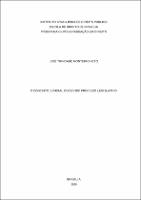Use este identificador para citar ou linkar para este item:
https://repositorio.idp.edu.br//handle/123456789/2999| Título: | O conceito judicial do devido processo legislativo |
| Autor(es): | Monteiro Neto, José Trindade |
| Orientador(es): | Silva, Rafael Silveira e |
| Palavras-chave: | Processo legislativo;Controle judicial;Legitimidade da legislação;Devido processo legal |
| Data de submissão: | 2020 |
| Editor: | IDP/EAB |
| Citação: | MONTEIRO NETO, José Trindade. O conceito judicial do devido processo legislativo. 2020. 129 f. Dissertação (Mestrado em Direito Constitucional) – Instituto Brasileiro de Ensino, Desenvolvimento e Pesquisa, Brasília, 2021. |
| Resumo: | Esta pesquisa busca sistematizar as diversas acepções assumidas pelo princípio do devido
processo legislativo nas manifestações por meio das quais o Poder Judiciário exerce o controle
da validade e da legitimidade da atividade legislativa. A análise parte da teoria discursiva de
democracia, que estabelece como fonte da validade de um provimento estatal a abertura
discursiva e participativa presente no processo de produção desse provimento. A partir disso,
justifica-se o exercício do controle judicial sobre o processo legislativo, à luz do paradigma
procedimental, visando não apenas a garantir sua regularidade formal, mas também a robustez
discursiva, pautada nos direitos fundamentais de participação. Nesse contexto, analisaram-se
manifestações jurisdicionais dos cinco Tribunais Regionais Federais, do Superior Tribunal de
Justiça e do Supremo Tribunal Federal que se valeram da menção expressa ao mencionado
princípio, encontrando grande diversidade de acepções, sistematizadas sob os vieses subjetivo
e objetivo, e, neste segundo âmbito, sob uma gradação, de acordo com a profundidade da análise
do devido processo legislativo e a força do controle jurisdicional sobre a atividade legiferante.
O trabalho apresenta ainda dados quantitativos acerca das manifestações colhidas nas instâncias
judiciais analisadas, em relação à forma como tal princípio foi abordado em cada uma. |
| Abstract: | This research aims to systematize the different meanings assumed by the principle of due legislative process in the deliberarions by which the Judiciary exercises the validity and legitimacy’s control of legislative activity. The analysis starts with the discursive theory of democracy, which establishes as a source of the validity of a state exposure the discursive and participatory openness present in the production process of this pronouncement. From that, the exercise of judicial control over the legislative process is justified, in light of the procedural paradigm, aiming not only to guarantee its formal regularity, but also the discursive robustness, based on the fundamental rights of participation. In this context, were analyzed the jurisdictional manifestations of the five Federal Regional Courts, the Superior Court of Justice and the Federal Supreme Court that used the express mention of the aforementioned principle, finding a lot of diversity of meanings, systematized under subjective and objective perspectives, and, in this second scope, under a gradation, according to the depth of due legislative process’ analysis and the strength of jurisdictional control over the production of laws. This dissertation also presents quantitative data about the manifestations gathered in the judicial instances analyzed, in relation to how this principle was approached in each one. |
| URI: | https://repositorio.idp.edu.br//handle/123456789/2999 |
| Aparece nas coleções: | Mestrado Acadêmico em Direito Constitucional |
Arquivos associados a este item:
| Arquivo | Descrição | Tamanho | Formato | |
|---|---|---|---|---|
| Dissertação_ JOSÉ TRINDADE MONTEIRO NETO_MESTRADO EM DIREITO_2020.pdf | 791.52 kB | Adobe PDF |  Visualizar/Abrir |
Os itens no repositório estão protegidos por copyright, com todos os direitos reservados, salvo quando é indicado o contrário.
